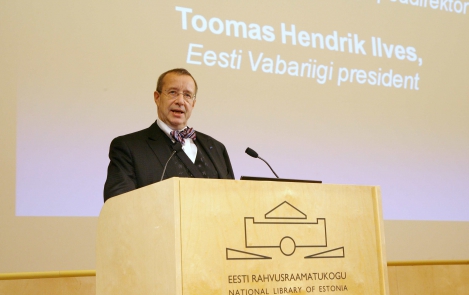-
Reset
+


President Ilves on Mother Language Day: Estonian schools should focus more and more on teaching written self-expression
14.03.2012
President Toomas Hendrik Ilves, who gave a presentation today at the Mother Language Day conference that took place in the Estonian National Library, recommended that gymnasiums and universities demand more written papers from their students, as in this way young people would learn to write their thoughts down in a systemised way.
The Estonian educational system should, at different levels, place more emphasis on teaching written expression skills at homework and class and seminar work level, told President Ilves, adding: "I know from first-hand experience how well one can organise his or her thoughts by writing them down. One can check the logics of a discussion from either paper or a computer screen."
The Head of State recalled a feature, published by the Rector of University of Tartu, Alar Karis, in the last week's Postimees newspaper, in which he wrote that the use of ghostwriters has become very common in universities. Students have a certain level of knowledge of the subject in question, but they are unable to express themselves in writing; therefore, they pay for their course and bachelor degree papers to be written by those who have mastered the art of writing.
"I think this is a serious problem; people first cheat the university and their prospective employer for a while but, ultimately, they cheat themselves. Sooner or later life will bring out the real face value of a highly educated specialist," told President Ilves. "But such a cheating scheme could never be applied if every student would be required to write – consistently and a lot – from the very first year. And at the same time, he/she would learn to write down his or her thoughts."
On the other hand, this would provide professors with an overview of mental capacities of each and every student. A written paper, bought from someone else, would immediately set apart a student with limited abilities and anyone cheating would be caught, told the Head of State, admitting: "Of course, this will only be possible once a normal allocation of teachers and learners are restored in our universities. Professors will never learn all the names of their large classes and course, not to mention handwriting or ways of thinking."
President Ilves also spoke about writing techniques of the modern world and mentioned that many psychologists have proved, empirically, that relative slowness in the mobility of the hand and fingers is the cause behind flawed written language; in other words, fingers cannot catch up with the words.
"We do not have to slow down our thinking but make our hands go faster, instead. Today, different keyboards are used to write 99 per cent of texts. The children of today learn to read and write behind their computers," the Head of State explained. "The technique used to enter text has a rather beautiful and old-fashioned name in the Estonian language – tippimine (tipping); however, the young people of today are using the word in a completely different context. 'Tippimine' in the true meaning of the word means the skill of blind typing, using all ten fingers, or the skill of writing one's ideas down, correctly and very fast. Unfortunately, I have never heard of this vital skill being taught, systematically, to the children and young people of today. However, as the children of today learn to read and write at their computers, special software programmes based on the Estonian language could be developed for learning 'tipping' or typing."
Full text of the address by President Ilves is available at www.president.ee
Office of the President
Public Relations Department
Phone +372 631 6229




